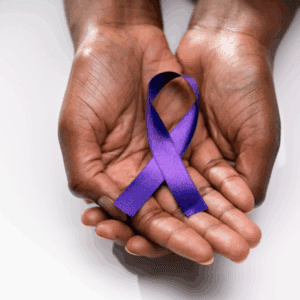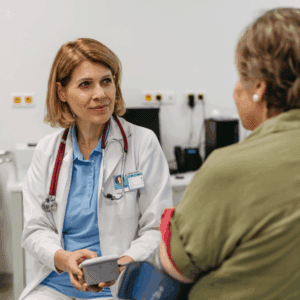Dr. Paul Oberstein addresses common clinical trial misconceptions, explaining how trials often build on standard treatment approaches and may offer closer monitoring and better outcomes.
Dr. Paul Oberstein is Section Chief of Gastrointestinal (GI) Oncology at NYU Langone and Assistant Director of the Pancreatic Cancer Center of NYU Langone’s Perlmutter Cancer Center. Learn more about Dr. Oberstein.
Related Resources
Transcript
Jamie Forward:
There are a lot of misconceptions out there. So, what would you say to somebody that’s just a little leery of clinical trials?
Dr. Paul Oberstein:
Yeah. So, clinical trials encompass a lot of different treatments. So, I think I would encourage that person to talk to their provider and share their concerns. And hopefully, they can be addressed. If they’re not comfortable they shouldn’t do it, of course.
But many, many clinical trials have only very small changes from the standard therapy. Meaning, we’re doing the regular therapy and adding something to it. And obviously, adding something can cause more side effects. But talking about what those are, how we manage them, how we treat them is very reassuring. Of course, there are other trials that are very much exploratory, right? There’s something that’s never been tried before and if a person’s not comfortable with that, they’re not the right person for that trial, right? But there are trials that should be appropriate for most people.
Jamie Forward:
Sure. If they join a trial and they decide that they’re not comfortable, they can leave at any time. Is that correct?
Dr. Paul Oberstein:
Correct. So, yeah. So, the nuances of trials are many. I don’t think we can cover every detail. But absolutely, a person can enroll in a trial and then come off the trial for any reason, right? That they choose. It could be because they just don’t want to do it anymore, the side effects are not acceptable to them, or it’s not working in the way that they thought it would work.
So, I think getting on a trial is always a good idea. We have some pretty good data showing that people who get treated on trials, even if they get the standard chemo, seem to do better than those who get the standard chemo off trial. And we think that’s because they’re monitored more closely. The algorithms are followed more closely. But there’s a lot of value to being on a trial. It usually has a downside. So, usually it means that a person has to be treated at a certain center, or they have to come for extra visits, or get a biopsy or extra blood tests. So, I think the critical thing is to talk to the team about what are the requirements of the trial, and is it something that’s appropriate for that person?
Jamie Forward:
Sure. That’s a great point. So, related to symptoms and side effects. Of course, I’m sure that varies quite a bit across the board based on treatment, etc., but why should patients always share anything that they’re experiencing with their care team?
Dr. Paul Oberstein:
Yeah. So, we strongly encourage patients to share, at the cost of oversharing.
I think, obviously, many symptoms that a person has are things that are difficult for a physician or medical team to know or to see or quantify exactly. Things like nausea, loss of appetite, even pain. It’s very hard to measure these things, right? And so, we do see patterns. We know that many patients will have certain symptoms. And so, if someone reports to us how they’re feeling, if it fits into a pattern, we can more confidently say what’s causing it and how to treat it. If we – if someone waits too long, or they say, “I don’t want to bother the team with that.”
We often miss an opportunity to treat minor things before they become major things. And also, we need to know what’s happening to the person, because it will guide the way we change therapy and things we can do. I would say that we partner – I’m a medical oncologist, but we partner very closely with our palliative care or supportive oncology team who help with very specialized treatments with pain, appetite, nausea, fatigue, as appropriate.
And it’s really important for our patient to be really expressive of how they’re feeling, because we have a lot of treatments that can help. So, if we don’t know about it, we can do it. But if someone talks to us, we can help them, in many cases.



